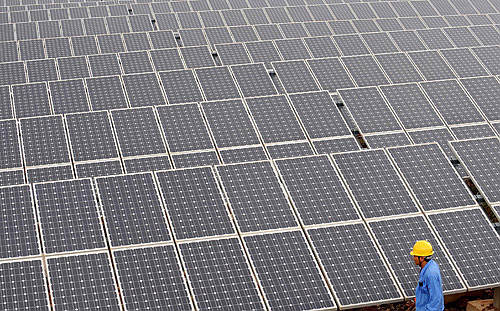|
 |
|
LOW-CARBON MISSION: The massive solar-power station in Yi Minority Prefecture in Yunnan Province has been put into trial operation. As part of China's economic development, the country will shift toward a low-carbon economy (LIN YIGUANG) |
The government should work to provide equal public services to both rural and urban residents giving rural inhabitants and urban dwellers the same basic living guarantee system. South coastal Guangdong Province vowed to invest 2.5 trillion yuan ($366 billion) in equalizing the province's rural and urban areas.
Fourth, China's economy will transform from a high-carbon economy to a low-carbon one.
Fifth, the economic growth will be led by the market instead of the government. The economic development model with the core of pursuing GDP growth is closely tied to government-led economic growth. Traditionally, the government tends to take every measure to ensure expansion of economic quantity rather than quality, but in the 12th five-year plan, this mindset must be changed and the function of government must be transformed.
Liberating mind
In practice, the development transformation must be accompanied by a profound and widespread reform of people's mindsets and ideas, which are also recognized as a prerequisite for a sound implementation of new rules and regulations.
First, the phrase "economic growth" must be replaced with "economic development." Economic growth encompasses a government-led, state-owned economy based on heavy and chemical industries and driven by investment and export. The costs of such economics are resource depletion and excessive pollution.
But development, aside from the "growth" element, factors in the elements of structure, distribution, employment and environment. It is only wishful thinking that all problems can be solved during the growth process. In the longer term, the blind pursuit of growth might give rise to more problems and conflicts.
Therefore, the government must get rid of the GDP-oriented development mindset and invest more in structural reform, resource and environment protection, employment and the development of the individual.
Second, the decision makers should switch from a "rich nation first" mentality to a "rich people first" one.
It is imperative that both the nation and people become richer, or at least share the wealth. But historically, China has focused on national economic growth, leading to insufficient domestic consumption. And under the circumstances that have developed since the founding of New China in 1949, the lack of propellant toward economic development has allowed income gaps to form and widen. Therefore, the idea of allowing people to become richer will help increase salaries and hence spur social consumption.
Third, the economic "cake" should be made better instead of bigger. Thirty years ago, China was faced with severe production factor shortages, especially in terms of capital. As a result, the country worked hard to increase the economic output to make a big economic cake. At present, the cake is already big enough, but now sharing the cake has become an issue. China is now at a critical juncture whereby it cannot make a bigger cake if it cannot share the cake wisely.
Fourth, state-owned capital should change from profit-oriented to public interest-oriented. The phenomenon that state-owned enterprises (SOEs) advance while private companies retreat came into the spotlight after the financial crisis. But the proper course of action now is seeking progress for both state and private companies.
In order to collect more state-owned assets in the past, the government relied heavily on SOEs. Under the present market economy, the SOEs still hold an important position in stabilizing and accumulating state assets, but more private forces should be called in to expand the state asset basis.
At present, the state assets should be distributed more into public sectors instead of the market. They must also, in time, retreat from market activities altogether. Therefore, the state assets must choose between profitability and public interest, or at least strike a balance.
Under the current circumstances of the shortage of public goods, SOEs must take up the responsibility of providing equal public goods services to all people. SOEs should always keep in mind that public interest is the basis for profitability. | 